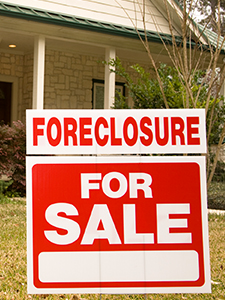POST TAGS
Blog posted On March 19, 2020

In a home foreclosure sale, the seller is a bank or mortgage lender who has seized the property from the owners who were unable to make their mortgage payments. To make up for the losses, the bank or lender sells the property.
While a typical real estate transaction occurs between a seller, a buyer, and their respective agents, a foreclosure sale is generally sold by the bank without a seller’s agent. So that means you don’t need a buyer’s agent, right? Wrong. Here are four reasons why you still need to work with an agent:
Unless you buy foreclosed homes for a living, you probably don’t know all the ins and outs of the process.
“Negotiating with a bank is very different than negotiating with an individual,” real estate agent Chuck Vosburgh told Realtor.com. A real estate agent who is well-versed in foreclosure transactions understands the bank’s process and knows what to expect in each stage of the negotiation.
If you have bought a foreclosure in the past, keep in mind that no two foreclosures are the same. Each bank has their own procedures, and a seasoned real estate agent is your best option in navigating the nuances.
In the event of a foreclosure, the bank is simply trying to recover the money they lost. They create a contract that is often up to 20 pages of conditions, all of which are put in place to protect the bank, not the buyer.
Buyers often see a foreclosure as a great deal on a home, but without a buyer’s agent you may not get the deal you’re looking for. The agent will review the contract and act as a fiduciary in your best interest. They will help you navigate the transaction and avoid risk and pitfalls.
When a foreclosure is being sold, the bank may have very limited information about the house. More often than not, they do not know the last time anything was updated or repaired, or what may need repairs. That’s why a buyer’s agent is so crucial in these situations. The agent has experience in identifying problems within the home, as well as working with inspectors who can conduct a professional assessment of the property.
For example, if the inspector identifies an issue such as mold during the inspection, the bank selling the home has to pay for its removal. A buyer without an agent likely won’t know that, and most banks won’t freely volunteer that information. A buyer’s agent will help negotiate the actions and solutions for situations like this.
A foreclosure may seem like a low price, but you should still look at comparable properties in the area. A buyer’s agent can share information on the market that you may not know. The home may be in a declining neighborhood or have poorly rated schools. Your agent will be able to give you a fuller picture of the location, condition, and comparable sales that you may not have considered on your own. These qualities are also important when considering the resale value of the home.
Many people see a foreclosure as a great deal on a home, and figure they’ll save even more money by skipping on the agent. Enlisting the help of a buyer’s agent is extremely helpful when buying a foreclosure. A buyer’s agent is able to facilitate the transaction, protect your interest, and provide you with information about the home, the neighborhood, and other homes on the market.
Source: Realtor.com